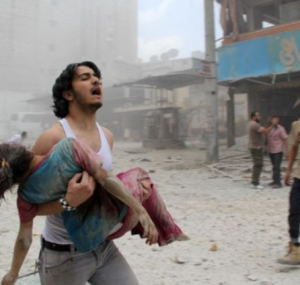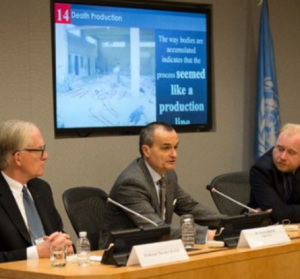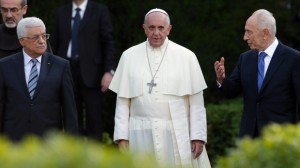By Kathryn Maureen Ryan
Impunity Watch Managing Editor
DAMASCUS, Syria – International prosecutors said on Tuesday that it is still possible to hold those reasonable for war crimes in Syria accountable despite the efforts by Russia and China to block any cases being referred to the international Criminal Court by the United Nations Security Council. Last month both Russia and China vetoed a U.N. Security Council resolution to refer the situation in Syria to the International Criminal Court for possible prosecution of war crimes and crimes against humanity committed by actors on both sides of the conflict.

However, despite the veto it is still possible to prosecute those reasonable for war crimes and crimes against humanity in Syria. “Just because we have had one veto in the (UN) Security Council should not stop any of us from moving forward and seeking justice for the people of Syria,” said David Crane, the former Chief Prosecutor for the Special Court for Sierra Leone who prosecutor who indicted Liberian president Charles Taylor.
Syrian President Bashar al-Assad topped a list of 20 sample war crimes indictments of both government officials and rebels drafted by experts for eventual prosecution. The listed was given to the International Criminal Court (ICC). According to David Crane, now serving as the head of the Syria Accountability Project, this list cites specific violations of the Rome Statute for specific incidents under which a suspect could be charged.

Crane said the list, which was compiled by his expert group, includes both members of Syria’s military and political elite and rebel Islamist groups, the Islamic State in Iraq and the Levant (ISIS) and the al-Nusra Front. Crane told the Press; “we have about 20 indictments of those who bear the greatest responsibility. This is a neutral effort. We’re not just going after Assad and his henchman, we are actually documenting all incidents on both sides.” although he gave no names of individuals other than Syrian President Bashar al-Assad
Desmond Lorenz de Silva, another former chief prosecutor of the Special Court for Sierra Leone, told the press that prosecuting war crimes outside of the UN system could be possible because a number of special court, including the Nuremberg trials against suspected Nazi war criminals after World War II were created outside the UN system. He said; “it’s already been done. Justice will be done in this case.”
Both Crane and de Silva were among the legal experts behind the “Caesar Report” released earlier this year which contained about 55,000 photographs depicting the tortured and abused bodies of around 11,000 people who had been killed in Syria prions between 2011 and 2013. The report is a rare visual documentation showing some of the extent of horrific atrocities committed in Syria during the nation’s three year civil war.
“We rarely get this type of evidence, most of it is circumstantial,” Crane said of the 55,000 photographs of people killed by the regime, many of the horrific photos showed evidence of forced starvation and showed that many of the victims had their eyes gouged-out.
“Make no mistake about it, these photographs could not be faked. This takes responsibility for what happened up the ladder of responsibility. It is not an act of a maverick colonel or a mad major, this is government policy,” said Sir Desmond de Silva.
A separate team of United Nations investigators has produced four confidential lists of war crimes suspects on all sides of the Syrian civil war, but the investigators have so far declined to reveal any names.
For more information Please see:
Gulf Times – Assad Tops List Handed To ICC Of War Crime Suspects – 11 June 2014
India.com – Syrian President Bashar Al-Assad Tops List of Syria War Crimes Suspects Handed to ICC – 11 June 2014
News Republic – Possible to Prosecute Syria Crimes, Despite Veto: Prosecutors – 10 June 2014
Reuters – Assad Tops List of Syria War Crimes Suspects Handed to ICC: Former Prosecutor – 10 June 2014





